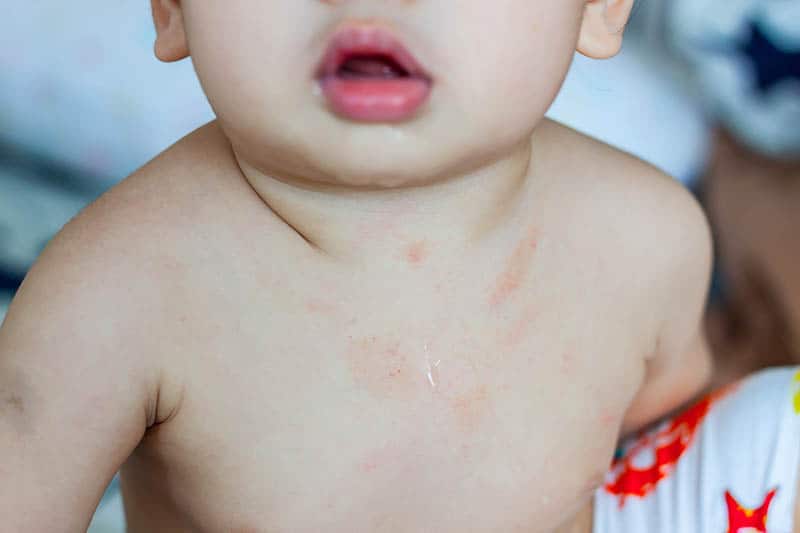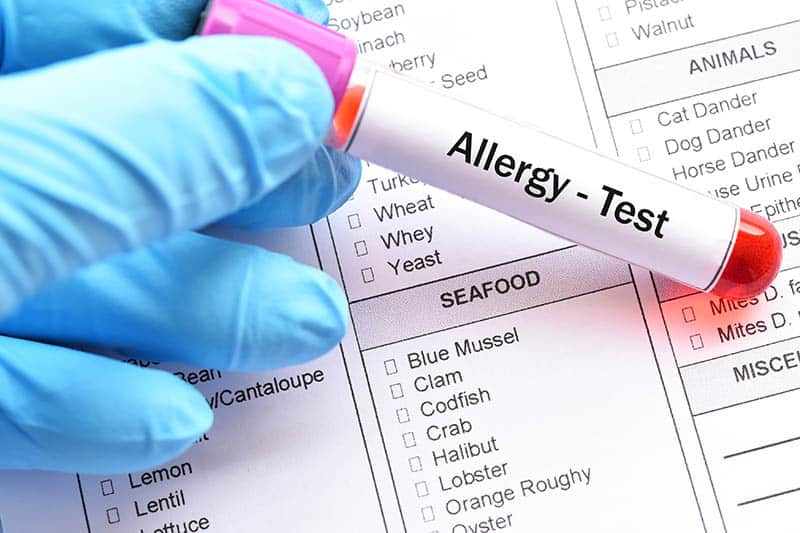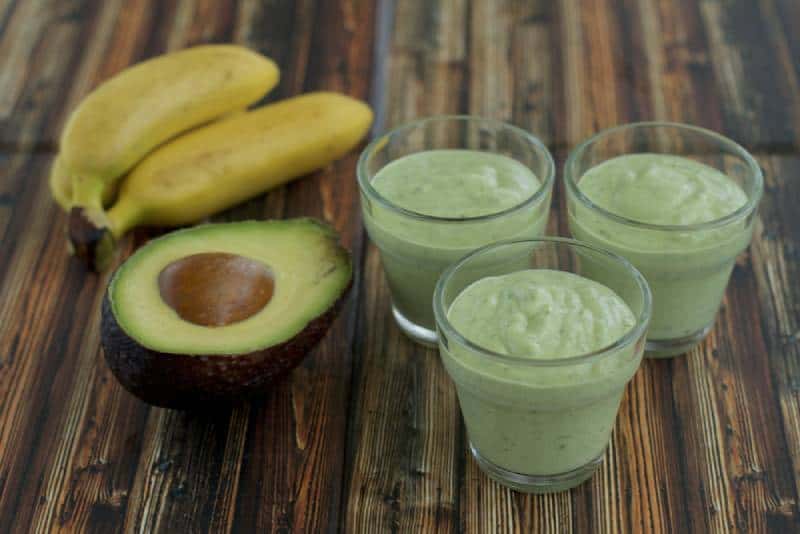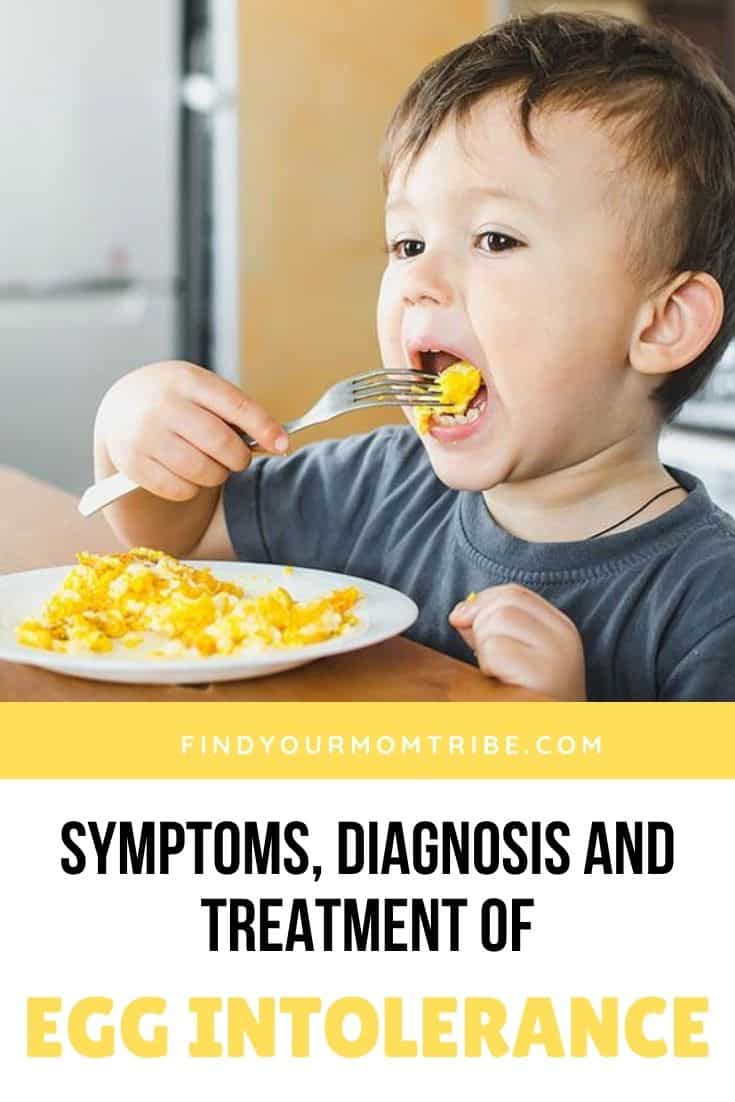According to some research, eggs are on the top of the list of allergy-causing food in young children. Even though your child is likely to outgrow their egg intolerance, it can cause many uncomfortable symptoms for a toddler.
Simply put, egg intolerance is the inability to digest eggs. Your child can have food intolerance for egg white, egg yolk, or whole eggs.
Even though luckily this is not a life-threatening condition, it is crucial that you notice the symptoms on time, so you can treat it accordingly with the help of your doctor.
4 Most Common Egg Intolerance Symptoms

1. Stomach pain
One of the first and most common symptoms of egg intolerance is abdominal pain. Even though this is uncomfortable to experience, it is usually nothing dangerous.
However, the problem with babies is that they can’t verbalize that they’re in pain nor do they know how to express that it’s due to a food sensitivity.
Instead, your little one will probably just cry until you figure out what’s going on.
Nevertheless, besides crying, there are also other symptoms that might help you figure out that your baby is in pain.
First and foremost, your baby will get cranky without an apparent reason.
He will have trouble sleeping and especially eating under a regular schedule.
Also, he will probably make a face that shows pain and discomfort, and will have trouble being calm.
So, now you know that your baby is in pain, but how can you be sure that they’re dealing with stomach pain? Well, the most certain way to tell is to notice their body movement.
You see, when their abdomen hurts, your baby is likely to pull one or both of his legs towards his abdomen. That is a surefire sign to help you identify the problem.
On the other hand, if you have a little older child, he will probably tell you that his tummy aches.
Even though this can happen due to eating too much or too little, in this case, it’s best to start tracking his diet.

2. Vomiting
Another symptom of egg intolerance is vomiting. Actually, this is usually the consequence of nausea and dizziness your child experiences.
Naturally, when you see your kid vomiting, you’ll probably panic and wonder what’s wrong.
However, just keep in mind that while this doesn’t have to be an alarming sign, it should definitely be examined.
3. Diarrhea
If your kid has developed an egg intolerance, they’re likely to have diarrhea a few hours after eating eggs, which is also an after-effect of abdominal cramps and pain.
4. Bloating
Have you noticed that your child’s belly looks a bit swollen after eating, despite not having had too much to eat?
Well, bloating and excessive production of gasses are common symptoms of egg allergies.
4 Egg Allergy Symptoms

Egg allergy is a different condition than egg intolerance. While egg intolerance impacts the digestive system, egg allergy affects the immune system.
You see, your immune system has the duty of protecting your entire body. It fights off infections and other potential dangers to your body.
When you have an egg allergy, your immune system misinterprets the egg proteins as hazardous and tries hard to chase them out of your body. These “fights” are manifested through an allergic reaction.
Egg allergy symptoms in your baby are quite similar to other illnesses.
However, what is particular about them is that the symptoms will show within a few minutes or hours after the child has eaten eggs or something that contains eggs.
1. Skin Issues

Suddenly, you will see pale and even swollen red bumps all over your child’s body. They are usually followed by itching or pain.
Skin rash can appear everywhere on the body, including your child’s tongue, lips, or even throat.
Sometimes these hives are small and sometimes they cover bigger areas of the skin. They don’t last more than one day.
2. Respiratory Problems
When it comes to respiratory problems, your child will experience allergic rhinitis. It includes sneezing, a runny nose, or nasal congestion.
It is not uncommon for your child to cough, sneeze, and experience wheezing and breathing problems, such as shortness of breath or tightness in his chest.
When you first notice these egg allergy symptoms, you might even mistake them for asthma. Sinusitis and rhinitis are also of the more common issues people with an egg allergy experience.

3. Abdominal Issues
Abdominal issues are symptoms of both egg intolerance and egg allergies. In both cases, your child may experience diarrhea, bloating, abdominal pain, or vomiting.
4. Anaphylaxis
Anaphylaxis is one of the most serious allergic reactions. It differs from all other symptoms because it can be extremely dangerous and even have fatal consequences.
It usually comes after hives and a skin rash. However, the crucial difference here is that here, the tongue or throat swelling occurs very intensely and quickly – within mere minutes.
Low blood pressure followed by a fast heart rate is one of the cardiovascular symptoms of anaphylaxis – a state of shock that often leads to loss of consciousness.
Also, cardiac arrest or coronary spasm is not uncommon.
When To Seek Medical Advice

The moment you start suspecting that something is wrong or that your child might be suffering from an egg intolerance or allergy, the smartest thing to do is to consult a specialist.
This is especially significant in cases of symptoms of an egg allergy.
If your child experiences symptoms such as breathing problems, severe itching, and hives, seek urgent medical help.
Be aware that these symptoms can radically worsen in a matter of minutes, so don’t wait for them to magically disappear.
The important thing here is to find out whether these health problems are caused by something else or eggs really are the issue.
Rule out things such as irritable bowel syndrome, lactose intolerance, or asthma.
Remember, it’s always better to be safe than sorry.
Treatment

Food Diary
At first, you can’t be sure whether your child suffers from a food allergy or intolerance and whether it’s egg-related. Well, the way to get to the bottom of the problem is to start keeping a food diary.
Basically, you keep a record of the food your child has eaten. Don’t forget to also write down the symptoms that followed certain food.
This way, you can see whether these symptoms are related to eggs.
If this is the case, it will all be quite clear after a few days. If your child has an egg intolerance or allergy, every time he eats eggs or egg products, he will have similar symptoms.
Along with jotting down egg-related foods and symptoms, it’s just as important to also note the lack thereof.
When you exclude eggs from your child’s diet, the symptoms should also be gone.
Food Intolerance / Food Allergies Test

It can be used on children as well, without any harm, since it simply tests the IGE antibody levels in your toddler’s blood. It brings quick and precise results.
When it comes to food allergies testing, it can be performed in more than one way.
The first is a skin prick test, done with the help of a food allergen. This type of test causes a controlled allergic response on the skin.
Basically, a small amount of egg protein (which is a food allergen in this case) will be put on your child’s skin.
After that, that skin area is pricked with a sterile probe that clears the way for the protein to penetrate under the skin.
The tested area will be observed for about 15 minutes. If your child suffers from egg allergy, that skin spot covered in egg protein will turn red or itchy in a few minutes.
In cases where the skin prick test is not possible, doctors perform a blood test, which is less efficient than the skin one.
Testing your child for allergies at a young age might sound scary and even unnecessary. However, it will help you a lot.
You’ll have less trouble introducing new foods to your little one’s diet.
This will give you peace of mind since you’ll know what type of foods your child is able to eat and process without the risk of potential trouble.
Elimination diet

A nutritionist will often recommend an elimination diet to parents who suspect their child suffers from an egg intolerance.
For starters, you will eliminate eggs or any food that might contain eggs for a week or even longer and wait for any possible reaction.
The trick to this approach is that you have to be extremely careful.
A lot of processed food contains traces of eggs, so you have to pay close attention to literally every single ingredient your child eats.
That is why you have to be aware of all other names under which eggs can be found in food:
- Egg yolk
- Egg white
- Globulin
- Ovomucoid
- Lecithin (E322)
- Egg derived lysozyme (E1105)
- Ovalbumin
- Ovovitellin
- Livetin
Another thing a nutritionist might suggest to give your child a small amount of a food allergen.
Of course, this has to happen in a controlled environment and under medical supervision.
Egg Alternatives

The problem with egg intolerance and egg allergy is that it excludes more than one type of food.
It’s not that your child can’t eat chicken eggs only – they shouldn’t consume other foods containing eggs or egg products, such as meatballs, cheesecake, meringue, ice cream, mayonnaise, and so on.
Luckily, nowadays, there are many egg alternatives and vegan egg replacements that can help you replace chicken eggs in your child’s diet.
You can use applesauce, avocado, tofu, and chia or flax seeds for yummy homemade baby food.
When it comes to cakes or ice cream, a quarter-cup of applesauce replaces one egg. On the other hand, tofu gives your food an “eggy” texture.
You can use ripe mashed avocado as an egg replacement when making chocolate or other baked goods.
Combine chia or flax seeds with some water or a baking powder and you’ll have yourself a chia egg, which is perfect for everyone with egg intolerance.
To sum up, egg intolerance is not dangerous if treated accordingly. However, it is certainly something you should pay attention to in order to spare your child many uncomfortable symptoms.
On the other hand, egg allergy can be a life-threatening condition. If you suspect that your child has symptoms of food allergy, contact your doctor ASAP.
Like this post? Please share or pin it for later. You can also stay in the loop and follow us on Facebook, Instagram and Pinterest.

This post contains affiliate links. Please see our full disclosure or more info.

